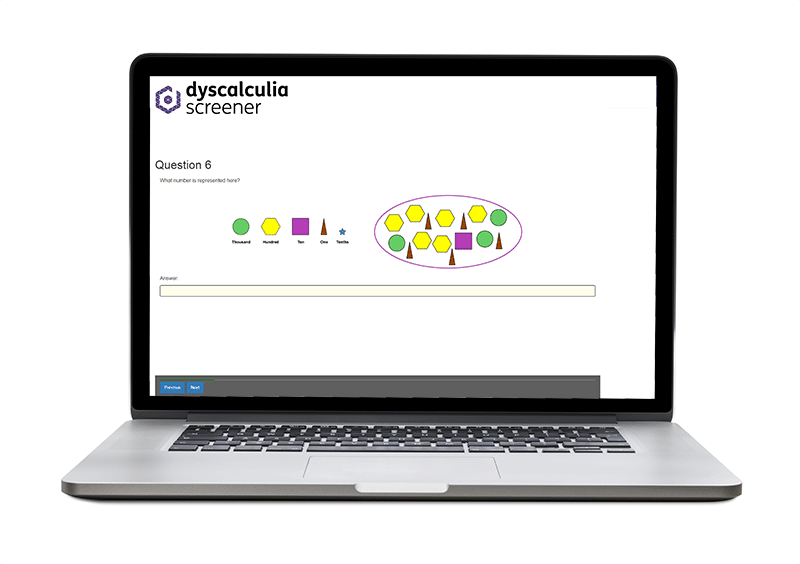At dyslexic.com, we are always bringing you news of the latest assistive technology to support adults and children with disabilities. This month, we wanted to give you information about dyscalculia and the launch of the new Dyscalculia Screener from iansyst – built in partnership with Loughborough University.

What is Dyscalculia?
Dyscalculia is a specific learning difficulty which makes it hard for individuals to make sense of numbers and other math concepts. It is often referred to as ‘dyslexia for numbers’, however not so much is known about dyscalculia. It is estimated that between 4% and 6% of the population suffer with dyscalculia. However, this research is based on data from children, and figures relating specifically to the adult population are non-existent. For this reason many people go undiagnosed.
Symptoms of dyscalculia include difficulties with:
- Counting, especially navigating back and forth in a number sequence.
- Calculating and recalling number facts. They may also fail when using rule to build on known facts, for example, they may understand that 2+7=9, but may not understand that 7+2=9 or 2+8=10.
- Relationship between words and numbers. For example, they may struggle with numbers with zeros and not understand that ten, one hundred and one thousand have the same relationship as 10, 100, and 1000.
- Measures such as handling money, temperatures, telling the time and more.
- Direction and orientation.
What is the Dyscalculia Screener?
The Dyscalculia Screener was originally launched back in the early 2000’s, being the first web-based screening solution for dyscalculia. This summer, we will launch a new and refreshed version of the Dyscalculia Screener to make the screening process even easier. The screener is designed to screen individuals or large groups and can be used by those struggling with maths in further education, higher education and in the workplace. It generally takes less than an hour to complete and comprises of a series of mathematical questions to indicate factors that suggest the individual is ‘at risk’ of having dyscalculia.

The Dyscalculia Screener has been built by iansyst in partnership with Loughborough University. It is based on a model which is built on two principal objectives: firstly, to establish the learner’s understanding of number and, secondly, their understanding of the application of number to other systems. Clare Trott, Maths Support Tutor at Loughborough University, will be speaking at the upcoming Learning Works Dyscalculia and Maths Learning Difficulties Conference on 29th June. Her talk will explore the issues surrounding both dyscalculia and dyslexia through case studies. iansyst will also be exhibiting at the conference, providing demonstrations of the new and exciting screening tool. To find out more about the conference, please follow this link to Learning Works: Dyscalculia Conference 2016.
How can I order the Dyscalculia Screener?
The Dyscalculia Screener is launching in summer 2016. You can find out more about the screener by following this link to the Dyscalculia Screener on dyslexic.com.

I have suffered from dyscalculia all my life and I ma now forty seven years old. People do not understand how one can be good at English and even learn other languages and disciplines but be hopeless at mathematics. I have improved because I work on the buses and numbers are running through my head all the time but sometimes I find worded math questions hard to fathom and I can’t do it under pressure with someone speaking over me as was once the case in a small exam we were required to do as bus drivers. I simply pushed the paper to one side to the astonishment of the examiner who could not understand why as a graduate with an MA I could not do it in five minutes flat as he talked over me and questioned how I had passed the earlier bus driver’s B’Tech exam which included mathematical questions. Quite simply the said exam was done in silence and we were given time to peruse the questions and work in quiet with sufficient time allowance and not any distraction.
Hi Scott – thanks for getting in touch and sharing your experiences of dyscalculia.
Unfortunately, there has been a real lack of awareness surrounding dyscalculia. There has also been significantly less support available when you compare assistive technology on the market to support dyslexia.
We are hoping that this is beginning to change now. As mentioned in the article, we are attending a conference next week which is primarily focused around math difficulties and has almost 250 attendees from education establishments across the UK. It’s really great to see that schools are starting to look into this disability more and see how they can support individuals with math learning disabilities. We also have a dedicated Maths Software section on dyslexic.com which has the latest assistive technology available to support dyscalculia.
Chloe
Is this a online assessment tool or not? Is it free or not?
Hello
The online Dyscalculia Screener is designed for people over 16 and indicates the likelihood of someone having dyscalculia.
For the latest prices and the option to buy you can visit our online shop https://www.dyslexic.com/product/dyscalculia-screener/.
Once purchased and processed you will need to register for the screener – http://dyscalculia-screener.co.uk/. We activate your account allowing you access to the screener within the year. You get the option of 1 screening with 1 in reserve for a practice run.
Hope this answers your questions.
Kind regards
Jan